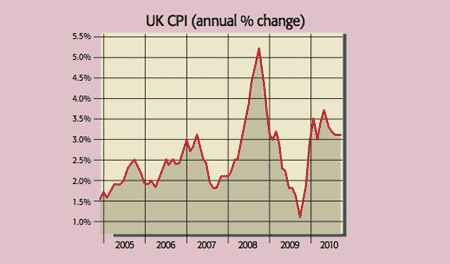
Britain’s economic recovery continues to look “immature”, as the Bank of England’s David Miles put it. This week’s monthly Nationwide consumer confidence gauge fell to an 18-month low. Meanwhile, the claimant count of unemployment edged up for a second successive month. The trade deficit edged down from a five-year high in August.
A survey of service-sector activity rose in September, although it is still down on February’s peak. And house prices are on the slide again, as the 3.6% slump in the Halifax index and deterioration in the Royal Institution of Chartered Surveyors survey show. Inflation remains sticky. In September the annual rate of consumer price inflation stayed at 3.1% for the third successive month. Clothing and footwear prices rose by 0.9% year-on-year, their first annual increase since 1992.
What the commentators said
The bad news for “hard-pressed families or impoverished fashionistas” is that this increase in clothing prices “isn’t going to be temporary”, said David Prosser in The Independent. VAT is going up in January and the latest Bank of England survey suggests that around 90% of retailers will pass the hike on. Now add higher recent commodity prices, notably food, and the overall rate of inflation could rise as high as 4% in the next few months. That’s double the Bank of England’s target, noted Simon Ward of Henderson Global Investors.
Since earnings, and now benefits, are rising by much less, that implies a further squeeze on consumer budgets, said Jeremy Warner on Telegraph.co.uk. That, along with households’ still-heavy debt load, bodes ill for retail sales, which the British Retail Consortium said have been “below par” for six months already.
We can’t count on a boost from exports, given that their performance this year has been “lacklustre and disappointing” despite the tailwind from the pound, said Howard Archer of IHS Global Insight. What’s more, global growth is now slowing. And all this is before the spending squeeze causes more job losses and undermines confidence. Capital Economics reckons the economy will expand by a mere 1% next year.
Many hope that further quantitative easing will pep up growth. But if inflation stays high, it will become harder for the Bank of England to justify printing more money, says George Buckley of Deutsche Bank. Whatever the Bank of England ends up doing, the emerging pattern of sticky inflation and poor growth seems likely to be with us for some time.